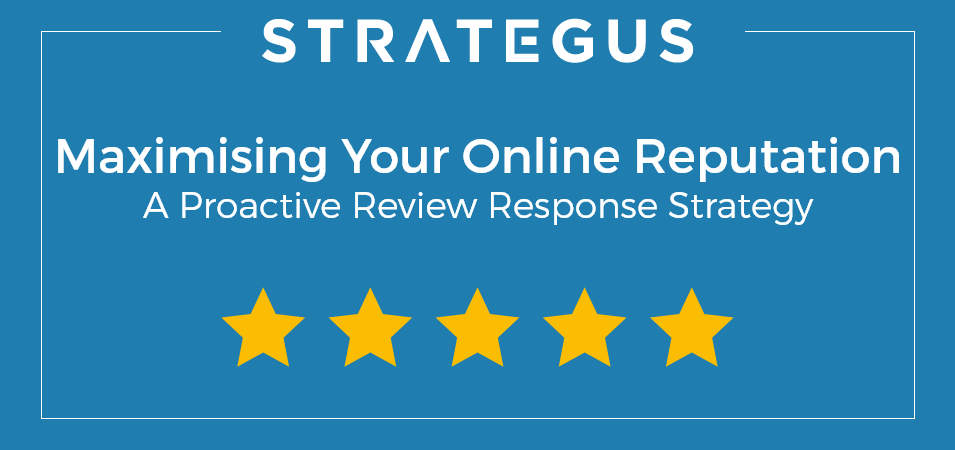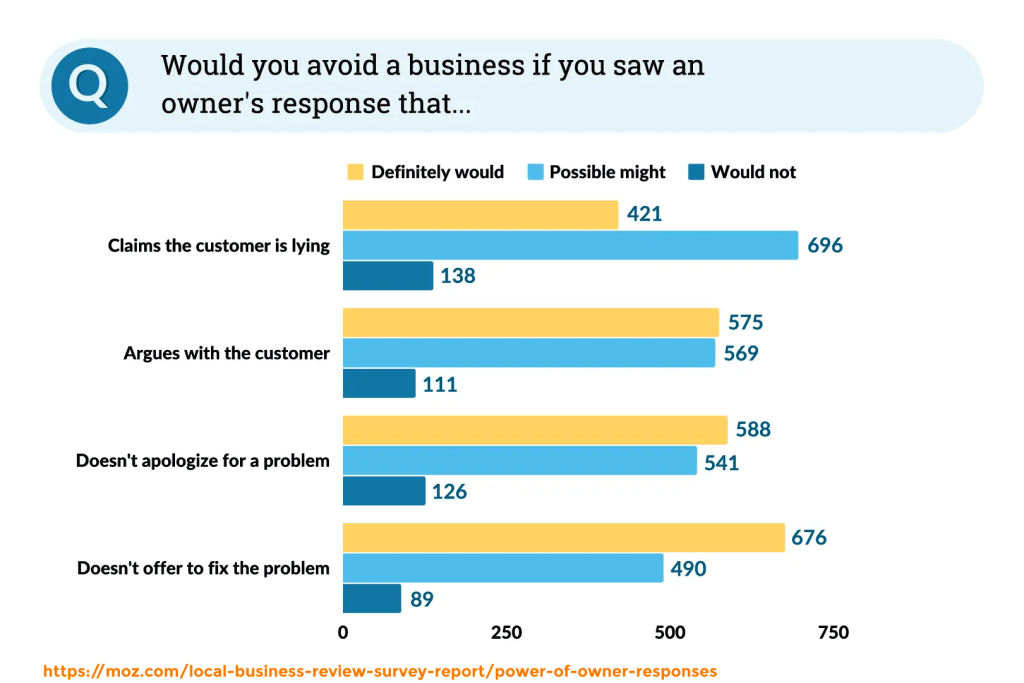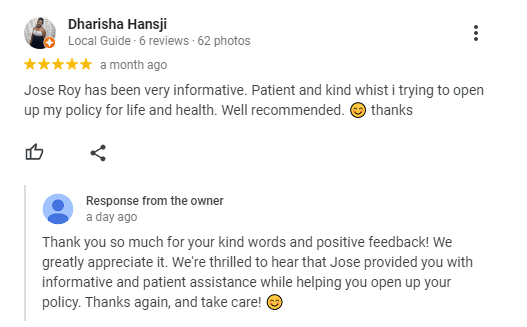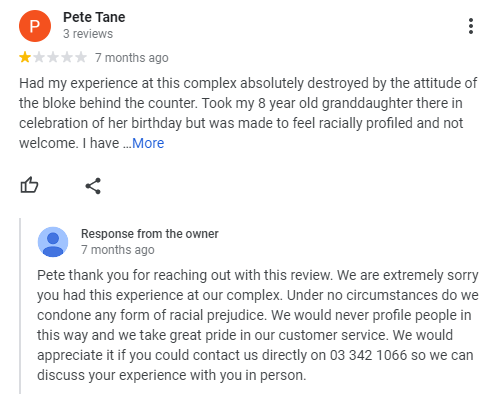
Maximising Your Online Reputation: A Proactive Review Response Strategy
As a business owner you will no doubt understand the impact that online reviews can have on the reputation of your business. Whether it’s a glowing testimonial or a scathing critique, it’s important to remember that every review good or bad, presents an opportunity to engage with your customers and build stronger relationships with your audience. Customer reviews not only influence potential customers, they can help establish trust and from an SEO perspective, they can improve your rankings and search visibility.
By responding to both positive and negative reviews promptly & thoughtfully, demonstrates that you care about your audience and are putting your customers first.
In this blog, we will provide you with a proactive strategy on how best to manage and respond to your reviews, we’ll cover why responding to reviews is so important, how and when to respond and provide some examples to help you get started.
So, lets delve in.
Why responding to reviews is so important

Of consumers are influenced to a moderate or extreme degree by owner responses to reviews.

Of consumers say they will definitely seek out a business that writes customised owner responses.

Of consumers read replies to reviews.
Source https://moz.com/local-business-review-survey-report/power-of-owner-responses, https://www.brightlocal.com/research/local-consumer-review-survey/
As you can see from the stats above people read reviews. Not only do they read reviews they place value in the responses. One of the major components of a successful online reputation is building trust with your audience. Reading review responses from owners allows consumers to assess the business’s responsiveness, transparency, and commitment to customer satisfaction. It helps them make informed decisions and feel confident about their choices when engaging with your business.
When to Respond
We recommend that you respond to reviews as soon as you can or at least within 2 days from when the review was placed. Responding as soon as possible will stand out to readers. Ideally you should build this into your daily routine, so it becomes a regular habit, try setting aside some dedicated time at a frequency that works for you, it could be the first thing you do when you start your day. Prioritize your responses based on the urgency of the response. Negative or severe issues should be top priority.
When to respond to a positive review
It’s a good practice to respond to positive reviews within a reasonable timeframe, typically within 24 to 48 hours.
When to respond to a negative review
Negative reviews require timely attention to address the customer’s concerns and demonstrate a commitment to resolving issues. Aim to respond to negative reviews within 24 hours or even sooner if possible. A prompt response shows that you value the customer’s feedback and are dedicated to finding a solution.
When to respond to urgent or severe issues
If a review highlights urgent or severe issues that require immediate attention, it is crucial to respond as quickly as possible. These issues may include safety concerns, legal matters, or serious customer dissatisfaction. Responding promptly demonstrates your commitment to customer well-being and can help mitigate potential reputational damage.
How to respond
We believe the best review responses are ones that are delightful, tailored to the context of the review and authentic. Be yourself and let your brand values and tone of voice shine through in the way you respond.
A delightful response goes beyond a standard acknowledgment or apology. It adds a touch of positivity, warmth, or humor that surprises and delights the reviewer. By injecting a delightful tone into your response, you can leave a lasting impression and create a memorable experience for the reviewer. This can foster a positive relationship with the customer and even encourage them to share their positive experience with others. Just take care when responding to a negative review that you use the appropriate tone in your response.
Authenticity is essential in review responses. It means responding in a genuine, sincere, and transparent manner. Avoid using generic or robotic language and instead use a conversational tone that reflects your brand’s personality. Authentic responses make customers feel that they are interacting with real people who genuinely care about their feedback. This humanizes the business and builds trust with customers.
Every business has its unique brand values and tone of voice. When responding to reviews, it’s important to align your responses with these aspects of your brand identity. If your brand is known for being friendly and approachable, infuse that warmth into your responses. If your brand has a professional and authoritative tone, ensure that comes across in your replies. Consistency in brand values and tone of voice helps reinforce your brand identity and builds familiarity with customers.
An example of a well written review response from one of our customers:
Pro Tip: If your struggling to come up with a thoughtful response to a review, don’t be afraid to use AI – copy in the review and ask AI to suggest a response. A word of caution though – make sure you review the comments before submitting it – ensure it has a human touch and sounds like something you would genuinely say! AI is a great tool to use to get you started.
Responding to negative reviews in particular
When it comes to replying to reviews this is the one we most get asked about. Our advise is to not take the negative review personally and take a deep breath before answering. Never answer a bad review in anger or frustration. Sure a bad review isn’t ideal, however its how you respond and deal with the problem that matters, here are some tips on replying to negative reviews:
- Respond in a timely manner.
- Understand your customers experience with your business before responding – investigate to see what may have gone wrong before responding, be honest about mistakes and steps you’ve taken (or will take) to remedy the situation.
- Be thoughtful and considered in your response. Show compassion and empathy for the customer. Respond as if the customer were in person.
- Apologise when appropriate, but don’t take responsibility for things that weren’t your fault.
- Provide a resolution
- Offer to talk it over – invite the customer to email or call so you can try to sort the problem offline.
- Show that you’re authentic and genuine – sign off with your name to show you’re taking the matter seriously and that a real person is listening.
Source: https://smallbusiness.withgoogle.com/free-google-training/how-to-respond-to-google-reviews
An response to a negative review from one of our customers:
How not to respond
We would be remiss if we didn’t point out how not to respond. These tips are fairly common sense, however, it’s worth going over – essentially combative and unhelpful owner responses will make a potential customer avoid your business. This is backed up by a survey undertaken by moz.com where they asked customers: “Would you avoid a business if you saw an owner’s response that”:
- Claims the customer is lying
- Argues with the customer
- Doesn’t apologise for a problem
- Doesn’t offer to fix the problem
More than half of customers will definitely avoid businesses who fail to offer a solution to the problem.
33% of consumers would definitely avoid a business if the owner’s response accuses a customer of lying.
46% will definitely avoid a business when the owner argues with customers in reviews.

Finally, use your reviews as a learning experience
Summary
#1
Respond to your reviews, every review, positive or negative, presents an opportunity to engage with customers and build stronger relationships with your audience.
#2
Customers are influenced by owner responses to reviews.
#3
Respond promptly and thoughtfully.
#4
Craft review responses that are delightful, personalized, and authentic to leave a positive impression on reviewers.
#5
Align your responses with your brand’s unique identity to maintain consistency and build familiarity with customers.
#6
Avoid combative or unhelpful responses to negative reviews, apologize when appropriate, and offer resolutions to problems to retain customer trust.
#7
Use your reviews as a learning experience.
Remember, a well-managed review response strategy can help enhance your online reputation and attract more customers to your business.




